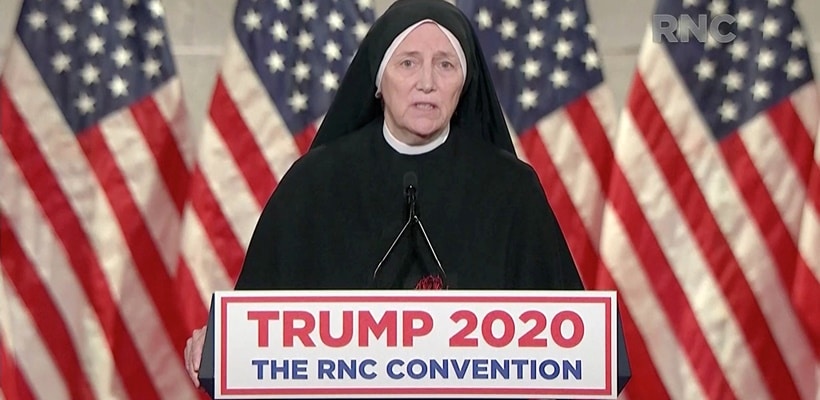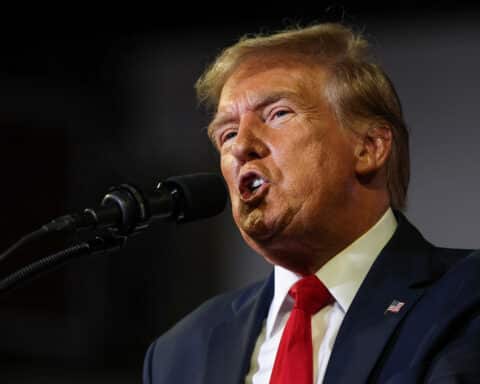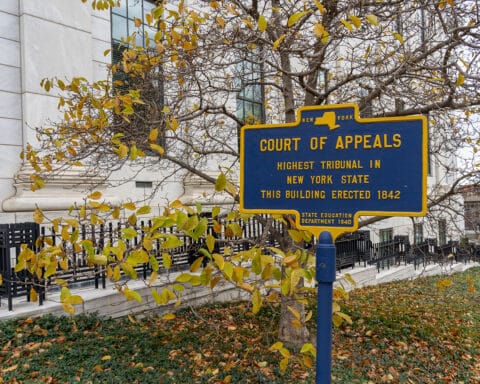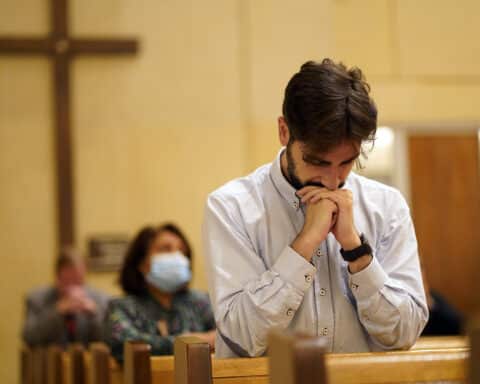The U.S. Constitution forbids a religious test for public office, but it is silent on office seekers’ appeals to religion and religious interests. And that is probably just as well, since religion seems destined to play — indeed, is already playing — an important, though largely unsought, role in the presidential politics of 2020.
The Democratic and Republican party conventions, both conducted in large part virtually, combined to make that clear. In doing so, they also provided a look ahead to what are likely to be major themes and issues in the weeks leading up to the November election.
Both campaigns are fully aware that the religious vote could be crucial to the outcome this year, just as it was in 2016, when Donald Trump received 81% of the votes of white evangelical Christians.
Trump’s margin of victory among Catholics was much smaller — 52% to Hillary Clinton’s 45% — but among white Catholics the percentage supporting Trump shot up to 60%. Among all voters, Trump received 56% of the votes of those who attend church weekly against 40% for Clinton, while the figures were reversed among those who never go to church — 62% for Clinton and 31% for Trump.
The campaign between now and Nov. 3 will be played out against the background of a coronavirus epidemic whose U.S. death toll is now nearing 200,000, continuing furor over police killings of Blacks coupled with protests and sometimes violent demonstrations in a number of cities, and a difficult economic recovery.
The first presidential debate, scheduled to be held Sept. 29 in Cleveland, is widely expected to be a turning point. But even as the campaign shifts into high gear, some political scientists and journalists have begun floating dystopian scenarios in the event of a contested outcome with no clear winner in November.
Religion taken seriously, abortion left out
The Democratic convention, held first, gave strong indications that the religious vote was being taken seriously by its planners. The intention apparently was to shake off the stereotype of the Democrats as the godless party. The immediate result at the convention was an abundance of prayers and expressions of religious sentiments.
On the Catholic side, that included contributions by Jesuit Father James Martin, an editor of America magazine best known for his book urging the Church to take a sympathetic view of homosexuals, and Sister Simone Campbell, executive director of a religious women’s lobbying group called Network.
But probably the strongest appeal to religion during the convention came from Sen. Chris Coons of Delaware, an ordained Presbyterian elder, who said Democratic presidential nominee Joe Biden would seek justice for “all people, people Joe believes were made in the image of God.”
One of the oddities of the Democratic convention was the absence of any mention of abortion.
Biden, a Catholic, says he supports abortion “under any circumstances” and has been endorsed by NARAL Pro-Choice America. He has promised that as president he would try to make Roe v. Wade, the Supreme Court’s 1972 decision legalizing abortion, a matter of federal law and would seek to abolish the ban on federal funding of abortion that he supported for years as a senator. His running mate, California Sen. Kamala Harris, is aggressively pro-choice, while the party platform takes the same line.
But despite all that, as The New York Times pointed out, the word “abortion” appeared nowhere in transcripts of the four-night convention. One possible explanation was provided by Wall Street Journal columnist William McGurn, who wrote that Democratic strategists were seeking to “soothe voters who might be troubled by a man who presents himself as an ordinary Catholic even as he advocates for abortion on demand, with no restrictions and paid for by taxpayer dollars where necessary.”
Abortion, front and center
Things were different, to say the least, with the Republicans.
As with the Democrats, the four-day GOP event also featured plenty of prayers and messages from religious figures.
The Catholics included Cardinal Timothy Dolan of New York — who, like Father Martin, said he would have been glad to pray at the other party’s convention if asked — and Nicholas Sandmann, the Catholic high school graduate from Covington, Kentucky, who has received settlements from CNN and the Washington Post arising from their reporting on his confrontation with a demonstrator during the 2019 March for Life. The convention also heard from former Notre Dame football coach Lou Holtz, who said Catholics such as Biden who support abortion are “Catholics in name only.”
In his acceptance speech, Biden combined criticism of Trump, passages of uplift calling for “hope and light and love” among Americans, and proposals for new federal initiatives on everything from education to infrastructure. Washington Post economics columnist Robert Samuelson estimated their cost, if implemented, would be $7.74 trillion in new spending over 10 years. Biden said he would cover much of that by closing tax “loopholes.”
Trump, for his part, responded to the criticism by sharply attacking Biden’s record as senator and vice president. In that context, he accused Biden and the Democrats of supporting late-term abortions. “Tonight, we proudly declare that all children, born and unborn, have a God-given right to life,” he said.
Trump took note of his nomination of two conservative and presumptively prolife justices — Neil Gorsuch and Brett Cavanaugh — to the Supreme Court. The issue of Supreme Court appointments also is likely to come up in the campaign, especially in light of the seemingly frail health of liberal Justice Ruth Bader Ginsburg, who has been treated several times for cancer.
If Trump and Biden agreed on nothing else, both at least agreed that the 2020 election would be a pivotal event.
Biden put it this way: “This is a life-changing election. This will determine what America is going to look like for a long, long time. Character is on the ballot. Compassion is on the ballot. Decency, science, democracy. They’re all on the ballot.””
And Trump said this: “This is the most important election in the history of our country. … This election will decide whether we save the American Dream or whether we allow a socialist agenda to demolish our cherished destiny.”
But perhaps the most telling final word was that spoken by one of the surprise stars of the GOP convention, Sister Deirdre Byrne of the Little Workers of the Sacred Hearts of Jesus and Mary. A medical doctor who was an Army physician for 29 years and held the rank of colonel, she now serves at a clinic for poor people and refugees in Washington, D.C.
Emphasizing the pro-life issue, she said, “I am not just pro-life, I’m pro-eternal life. I want all of us to end up in heaven some day.”
That was a sentiment to which most Democrats and most Republicans could probably say, “Amen.”
Russell Shaw is a contributing editor for Our Sunday Visitor.





